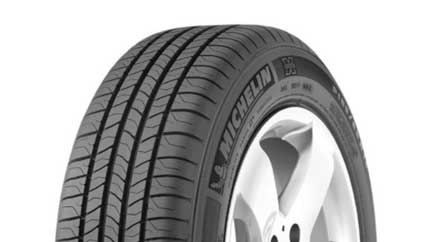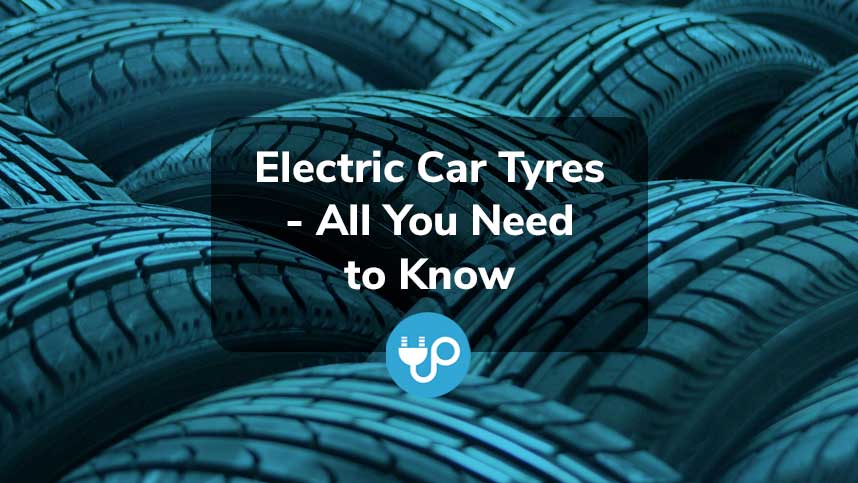
Electric Car Tyres – All You Need to Know
The automotive industry is undergoing a significant shift towards sustainability and eco-friendly solutions.
As a result, electric vehicles (EVs) have gained immense popularity in recent years.
Electric cars offer numerous advantages, including quieter operation and improved energy efficiency.
As electric vehicles require charging using an electricity supply, they produce less carbon emissions during operation than regular combustion engine vehicles.
However, one crucial component that plays a pivotal role in the performance, safety, and overall efficiency of an electric car often goes unnoticed - their tyres.
Electric car tyres are designed to meet electric vehicles unique requirements.
They differ from traditional combustion engine vehicle tyres, including their construction, materials, and tread patterns.
Choosing the right tyres for your electric car is vital to ensure optimal performance, range, and safety.
In this comprehensive guide, we’ll delve into the world of electric car tyres.
We’ll explore the key factors that differentiate them from conventional tyres, whilst shedding light on the essential aspects you need to know when it comes to maintaining and choosing the right tyres for your EV.
Chapters
Are EV Tyres Different to Regular Tyres?
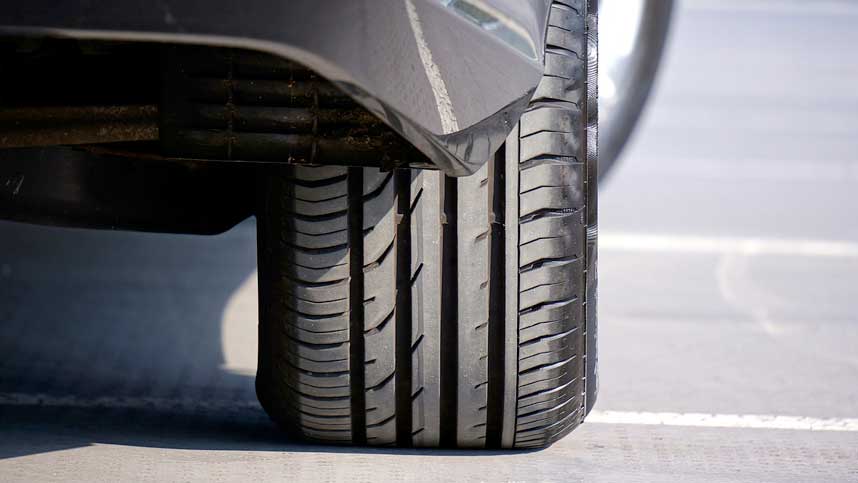
Electric vehicles (EVs) often require different tyres compared to regular cars with combustion engines for several reasons:
Weight Distribution
Electric vehicles tend to be heavier than conventional cars due to the weight of their batteries.
The batteries are typically located at the bottom of the vehicle, which affects the weight distribution.
This concentrated weight affects tyre wear and handling characteristics.
Therefore, electric car tyres are designed to handle the additional weight and distribute it evenly across the tyre contact patch.
Instant Torque
Electric motors provide instant torque, allowing electric vehicles (EVs) to accelerate quickly.
This increased torque can strain the tyres during acceleration, requiring tyres with higher traction and grip to ensure efficient power transfer and traction control.
Regenerative Braking
Electric vehicles often utilise regenerative braking, which converts kinetic energy into electrical energy, thereby recharging the batteries.
This type of braking puts different stress on the tyres compared to traditional friction brakes.
Electric car tyres must handle the regenerative braking forces and have a good grip during deceleration.
Low Rolling Resistance
One of the main goals of electric vehicles is to maximise their range.
To achieve this, electric car tyres are designed with low rolling resistance, which reduces the energy required to propel the vehicle forward.
Reduced rolling resistance allows the vehicle to travel further on a single charge, making the tyres more energy-efficient.
Noise Reduction
Electric vehicles are generally quieter than combustion engines, making tyre noise more noticeable.
To enhance the overall driving experience and reduce noise levels inside the cabin, electric vehicle tyres often have specific tread patterns and designs that help reduce road noise.
Aerodynamics
Electric vehicles often have sleek and aerodynamic designs to improve efficiency.
Tyres manufacturers may develop specialised tyre designs that help reduce aerodynamic drag, further increasing the vehicle's range.
While some electric vehicles can use regular tyres, manufacturers and companies are increasingly developing specific tyre models optimised for electric vehicles to address these unique requirements and improve their overall performance, efficiency, and safety.
Key Factors to Consider When Choosing Electric Car Tyres
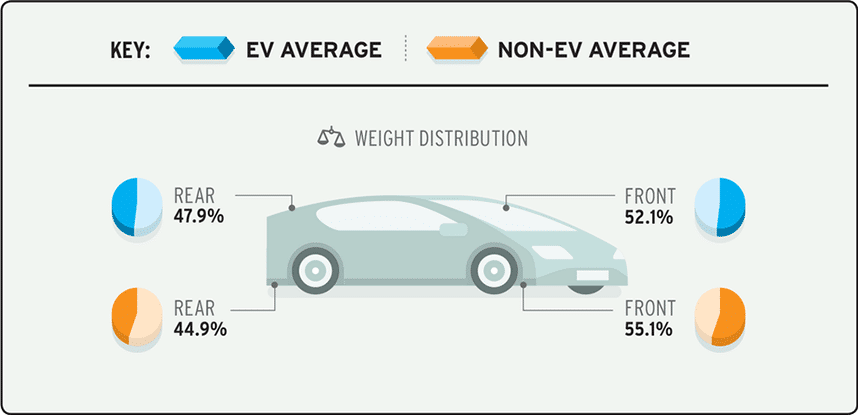
When choosing tyres for an electric car, there are several key factors that you should consider to ensure optimal performance and efficiency.
Here are the key factors to keep in mind:
Range & Energy Efficiency
Electric cars rely on battery power, and the tyres you choose can significantly impact your vehicle's range.
Opt for tyres with low rolling resistance, as they require less energy to move and can help extend your electric car's battery life.
Rolling Resistance
Rolling resistance refers to the force required to keep the tyres rolling.
Tyres with lower rolling resistance minimise energy loss, resulting in improved energy efficiency and increased range.
Look for tyres specifically designed for electric vehicles that offer reduced rolling resistance.
Noise Reduction & Comfort
Electric cars are known for their quiet operation.
To maintain a quiet and comfortable driving experience, consider tyres with noise reduction technologies such as foam inserts or advanced tread patterns that help minimise road noise.
Grip & Handling Performance
Electric cars often have instant torque, which means they can accelerate quickly.
Opt for tyres that provide excellent grip and handling performance to ensure you can safely and confidently navigate corners and maintain control during acceleration.
Size & Load Rating
Ensure your tyres are the correct size and have an appropriate load rating for your electric vehicle.
Tyres that are too small or have a lower load rating than required can compromise safety and performance.
It's essential to consult your vehicle's manual or consult with tyre professionals to determine the recommended tyre size and load rating for your specific electric car model.
Remember, selecting the right tyres for your electric car can significantly impact its range, efficiency, and overall driving experience.
By considering factors such as range, rolling resistance, noise reduction, grip, and size/load rating, you can make an informed decision and maximise the performance of your electric car tyres.
Best Electric Car Tyres Options Available in 2023
Here are some examples of tyre models that are specifically geared towards electric vehicles (EVs):
Michelin Energy Saver A/S
Michelin Energy Saver A/S tyre is known for its low rolling resistance, which helps improve the range of electric vehicles.
It offers excellent fuel efficiency and is designed to provide a comfortable and quiet ride.
Bridgestone Ecopia EP500
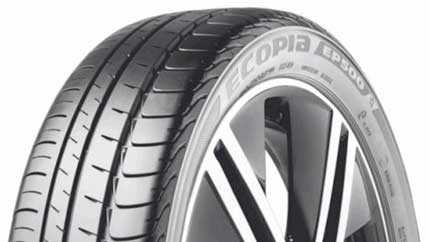
The Bridgestone Ecopia EP500 is a summer tyre specifically developed for electric vehicles.
It features low rolling resistance and enhanced grip, providing excellent handling and efficiency for EVs.
Continental Conti.eContact
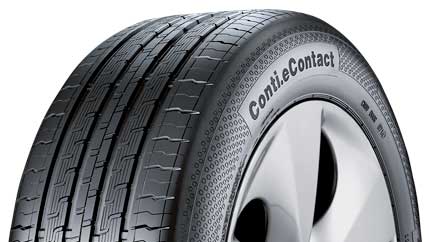
Continental Conti.eContact tyre is designed for electric and hybrid vehicles, focusing on low rolling resistance and energy efficiency.
It offers good traction on wet and dry surfaces while maintaining a quiet ride.
Pirelli Cinturato P7 All Season Plus
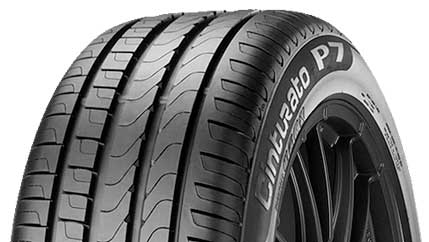
The Pirelli Cinturato P7 All Season Plus is an all-season tyre suitable for electric vehicles.
It provides reliable traction in various weather conditions, and offers reduced rolling resistance for improved energy efficiency.
Nokian WRG4
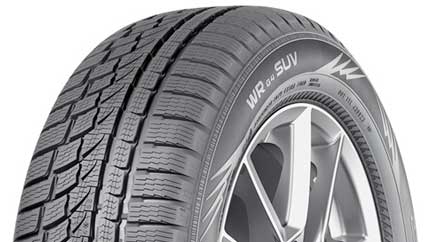
The Nokian WRG4 is a versatile all-weather tyre designed for electric vehicles.
It combines winter grip and handling with reliable performance on dry and wet roads, making it ideal for regions with changing weather conditions.
Goodyear Assurance WeatherReady
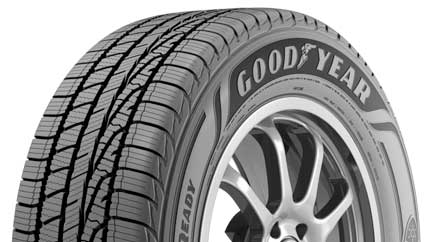
Goodyear Assurance WeatherReady tyre is designed to perform well in wet and dry conditions.
It offers enhanced traction and control for electric vehicles, with features like hydroplaning resistance and confident braking.
These are just a few examples of tyre models catering to electric vehicles' specific needs.
It's essential to consider the tyre size, load rating, and other factors the vehicle manufacturer recommends when choosing tyres for your specific electric car tyres.
Maintenance & Care Tips for Electric Car Tyres
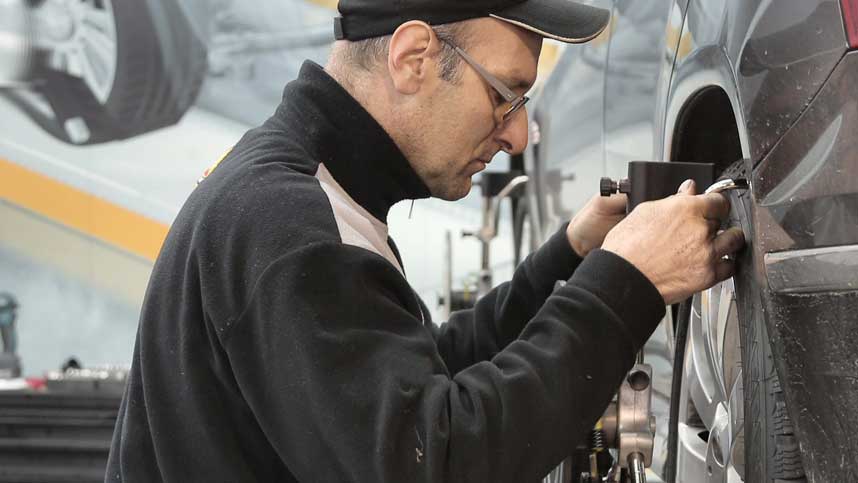
Proper maintenance and care for electric car tyres are crucial for ensuring their longevity and optimal performance.
Here are some tips to help you take care of your electric car tyres:
Regularly Check Tyre Pressures
Electric vehicles (EVs) tend to be heavier due to the weight of the battery pack, which can cause increased tyre wear.
Check the tyre pressure at least once a month and ensure it matches the manufacturer's recommended pressure.
Properly inflated tyres improve efficiency and extend tyre life.
Rotate Your Tyres
Rotating the tyres regularly promotes even wear across all four tyres.
Follow the vehicle manufacturer's recommendations for the rotation interval.
Typically, it's recommended to rotate the tyres every 5,000 to 8,000 miles (8,000 to 13,000 kilometres).
Wheel Alignment & Balancing
Proper wheel alignment and balancing are crucial for electric car tyres.
Misalignment can cause uneven wear and affect vehicle handling and efficiency.
Check your wheel alignment regularly, especially if you notice any pulling or vibrations while driving.
Maintain Adequate Tread Depth
Monitor the tread depth of your tyres to ensure they have sufficient grip. Use a tread depth gauge or the built-in tread wear indicators on the tyres.
Replace the tyres when the tread depth reaches 2/32 of an inch (1.6 millimetres) or according to local regulations.
Avoid Overloading Your EV
Excessive weight can strain the tyres and lead to accelerated wear.
Be mindful of the vehicle's weight limits and avoid carrying unnecessary loads.
Drive Conservatively
Smooth and controlled driving habits help minimise tyre wear.
Avoid sudden acceleration, hard braking, and aggressive cornering.
This reduces stress on the tyres and promotes a longer lifespan.
Regular Tyre Inspections
Inspect your tyres visually for any signs of damage, such as cuts, bulges, or punctures.
Additionally, look for uneven wear patterns that may indicate underlying issues.
If you notice any abnormalities, have them inspected by a professional.
Tyre Storage
If you plan to store your electric car for an extended period, ensure the tyres are correctly inflated and clean.
Store the vehicle in a cool, dry place away from direct sunlight to prevent tyre degradation.
Tyre Rotation During Charging
If you frequently charge your electric car at home, consider rotating the tyres while the vehicle is parked.
This can help distribute the weight more evenly and prevent excessive wear on specific tyres.
Use the Right Tyres
When it's time to replace your electric car tyres, choose those specifically designed for electric vehicles.
These tyres are engineered to meet the unique demands of EVs, including higher weight and torque.
Regular care and maintenance will help ensure your electric car tyres perform optimally and last as long as possible.
Frequently Asked Questions
Are tyres for electric cars more expensive?
Tyres for electric cars can be slightly more expensive than conventional vehicles due to their unique design requirements, such as the need to handle higher weight and torque.
However, the price difference may vary depending on the specific tire brand, size, and other factors.
Do tyres wear out quicker on electric cars?
Tyres on electric cars may wear out quicker compared to conventional vehicles.
Electric cars tend to be heavier due to the weight of the battery pack, which increases the load on the tires.
Additionally, the instant torque delivery of electric motors can put additional stress on the tires during acceleration.
Proper tyre maintenance, including regular rotation and inflation checks, can help mitigate accelerated wear.
Can you change a tyre on an electric car?
Yes, you can change a tire on an electric car just like a conventional car.
Changing a tire on an electric car is similar, involving removing the lug nuts, taking off the old tire, installing the new tire, and properly tightening the lug nuts.
However, it's essential to consult the vehicle's owner manual or manufacturer guidelines for any specific instructions or precautions related to tire changes for your particular electric car model.
Conclusion
In conclusion, electric car owners must pay careful attention to their tyre choices to optimise their vehicles' performance, efficiency, and safety.
Considering factors such as low rolling resistance, proper inflation, and adequate tread depth is crucial for maximising range and minimising energy consumption.
In addition to selecting the right tyres, another essential aspect of owning an electric vehicle is ensuring convenient access to charging infrastructure.
This is where Joosup, an innovative EV charger-sharing app, comes into play.
With Joosup, electric car owners can quickly locate and reserve charging stations, eliminating range anxiety and promoting seamless travel.
Download Joosup for iOS, as well as the Android version to use our electric vehicle charging service!


Blog Archive
- Electric Car Tyres – All You Need to Know
- Are Electric Cars Cheaper to Run?
- Do Electric Cars Use Oil?
- 70% of UK Councils Have No On-Street EV Charging Plans
- Joosup + waEV-Charge: Electrifying the Future Together!
- What is an EV Battery Lease?
- 8 Great Reasons to Share Your EV Charger
- What is OZEV?
- What is ULEZ Compliant?
- Electric Car Charging at Home with No Driveway – What Can You Do?
- EV Home Charger Installation for Beginners
- How to Drive an Electric Car
- What is Range Anxiety & How Do We Defeat It?
- What is Destination Charging?
- What is a CHAdeMO Charger?
- What is CCS Charging?
- What is Peer to Peer EV Charger Sharing?
- Types of Electric Car Plugs Explained
- What is Community Charging?
- How Long Does It Take to Charge an Electric Car?

